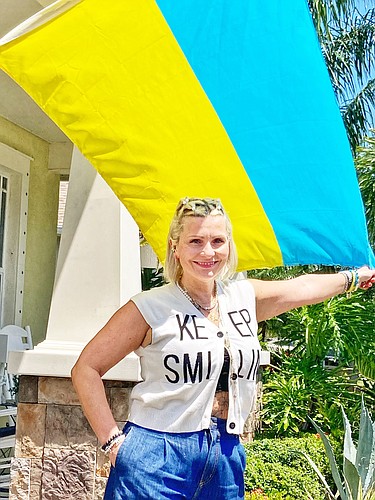- November 24, 2024
-
-
Loading

Loading

Central Park’s Dasha Schultz walked into her bedroom Feb. 20 to see her husband, Jason Schultz, watching the news about the beginning of the war in Ukraine.
The native of Ukraine watched as a reporter in protective gear reported on Russia's bombing.
Schultz immediately started messaging her friends who live in Kyiv, the capital of Ukraine, to see if they were OK.
“They were asking me if I knew what’s going on,” Schultz said. “Being in Kyiv, they’re like, ‘We’re hearing explosions. I think the war started.’”
The news of the bombings and the uncertainty of the safety of her friends and family in Ukraine overwhelmed her. Her mind went blank.
“From then on, I was glued to the TV constantly watching those reports,” Schultz said. “For a couple days I was in such a terrible depression. I’m not usually depressed. I’m a very happy person. I tend to believe that we need to live our life to the fullest, but it was just such a dark time.”
Schultz knew she had to help.
A Zumba instructor, Schultz decided to host Zumba classes to raise money to send to Ukraine. She also posted on social media asking for humanitarian aid supplies that she could send to Ukraine.
“I felt like this is my duty,” Schultz said. “Even though I’ve lived here for so many years now, I still love my country. I love all my people that live there, so I feel deeper ties to it. I felt like I needed to help somehow.”
Schultz was born and raised in Donetsk, Ukraine. She lived there until 2008 when she moved to southern Illinois to be with her mother, Iryna Cagle, and sister, Ekateryna Bondareva.
“I never wanted to move out of Ukraine,” Schultz said. “I always loved living there. I love my friends, my family, but it was hard for me because my mom was so far away when she moved. I was missing them a lot, and it’s hard to travel (to the U.S. from Ukraine).”
Her father, Sergey Bondarev, and grandmother, Vera Kazbanova, along with other relatives and several friends, still live in Ukraine.
Most of her friends moved to Kyiv, the capital of Ukraine, in 2014.
“My dad decided not to leave (Donetsk) because it’s his land," Schultz said. "He’s one of those old fashioned people who’s like, ‘I grew up here, I’m not leaving grandma.’”
When the war started in 2014, Kazbanova, who is now 96 and also lives in Donetsk, was too old to be able to travel elsewhere.
“Everybody’s OK right now,” Schultz said of her friends and family who still live in Ukraine. “You never know where the explosion is going to happen tomorrow. What worries me the most is the bombings are happening in random places that you wouldn’t expect them to happen. The targets are civilians, the targets are houses and apartment buildings.”
Schultz said Donetsk is rationing the water supply, but there is electricity and some stores are open so they are able to get food and medication.
“We just take it day by day and hope that this is all going to be over soon,” Schultz said.
After seeing the war had escalated in February, Schultz started looking for smaller local organizations that were on the ground in Ukraine helping refugees.
“I’ve kind of become a liaison between people here who want to help but don’t know what to do, how to help or which organization to donate to,” Schultz said.
Schultz and her family started collecting humanitarian aid supplies, such as toiletries, blankets, hygiene products and more. She posted on social media asking for donations and her sister created an Amazon wish list.
She knew a local Ukrainian-American shipping agency that would help her get the supplies from Bradenton to Ukraine.
“It was funny because when we started this, I didn’t realize the scale of this,” Schultz said. “Every single day my porch would be literally swamped with boxes. My neighbor’s kid started helping me, because we’re working throughout the day, by messaging me, ‘Your porch is full, do you want us to move everything to the back lanai?’”
Schultz said it was heartwarming to see so many people wanting to help and to provide donations.
She has packaged and sent out 400 pounds worth of humanitarian supplies.
In March, Schultz hosted two Zumba fundraisers that raised more than $2,000 in donations, of which $700 was used to pay for the shipping costs of the donated supplies and the rest was donated to nonprofits helping refugees.
Due to the cost of shipping supplies, Schultz decided to stop collecting supplies and focus on monetary donations to support at least four organizations helping with anything from providing civilians with food and medical supplies to an organization trying to buy a generator for a hospital in Chernihiv, a city devastated by the war and out of power. Another organization focuses on children who were displaced.
Her 9-year-old daughter, Sofia Schultz, wanted to help, so she decided to sell blue and yellow bracelets for $10 each. So far, Sofia Schultz has raised close to $500.
Sofia Schultz and other children in the neighborhood decided they wanted to help more. They took it upon themselves to have a popsicle stand. They raised $125.
“The kids were so excited to donate this money,” Schultz said. “They brought this envelope with all the ones and singles and they’re like, ‘Here you go, this goes to Ukraine.’ I was in tears because that made me so happy and proud of our kids.”
Schultz, whose native language is Russian, has been speaking and writing in Ukrainian more often and has encouraged her daughter to learn more about Ukrainian history.
“She’s proud to wear the yellow and blue bracelets,” Schultz said about her daughter. “She wants people to know that she’s Ukrainian.”